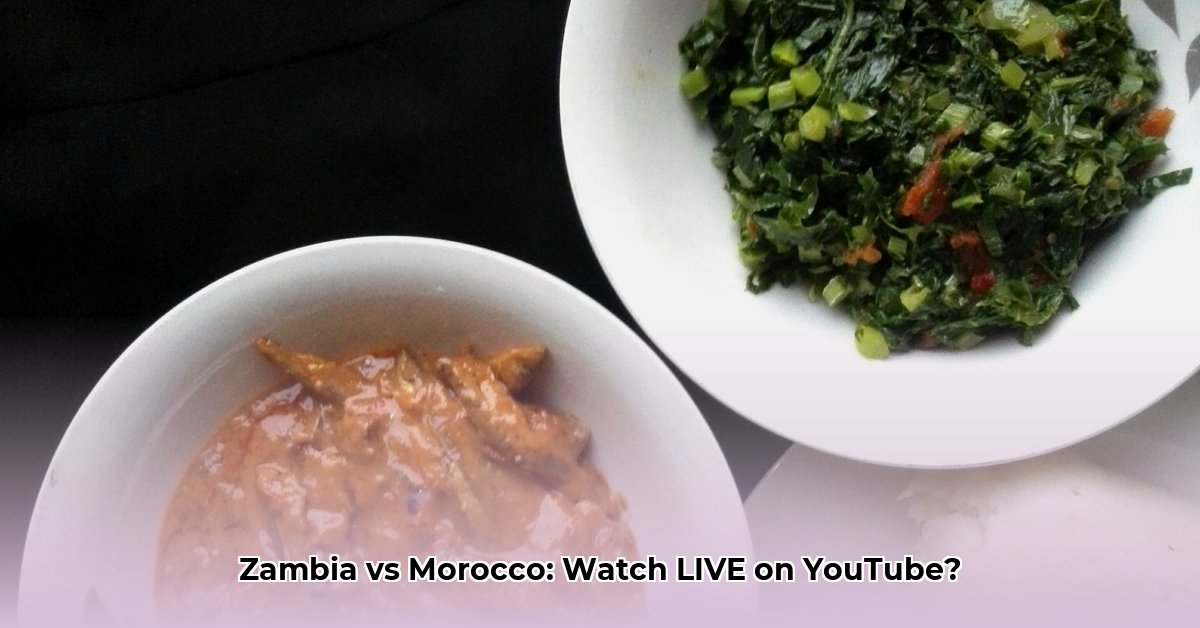
So, you wanted to catch the Zambia vs Morocco match live, and a simple YouTube search left you feeling more frustrated than a striker facing a brick wall? This isn't just a personal inconvenience; it highlights a massive issue in the world of sports broadcasting: the complex and often opaque business of securing and distributing viewing rights. Let's unpack the challenges.
The Broadcasting Rights Battle: More Than Just a Game
Securing the rights to broadcast a major sporting event like this match is a high-stakes game of its own. It's a global auction, with FIFA (football's governing body) and other sports organisations at the heart of it, holding the initial rights. Then come the established broadcasters – the likes of ESPN and beIN SPORTS – competing fiercely against the rapidly growing streaming giants, like Netflix and Amazon Prime, for regional or global broadcast rights. These deals dictate who can show the match, where, and how – often resulting in the frustrating experience of searching for a legal live stream proving fruitless for many fans. This is particularly true for fans geographically located outside of prime broadcast zones.
Geographical Limits: A Global Headache
Geographical restrictions are a major source of frustration for fans. A broadcaster might hold exclusive rights for a particular country or region, meaning viewers elsewhere are locked out, even if they're willing to pay. This territorial exclusivity, while beneficial for the rights holders in maximising revenue, creates a fragmented and often frustrating viewing experience for global fans where football (soccer) is arguably the world's most popular sport.
Streaming's Double-Edged Sword: Convenience and Chaos
Streaming platforms have revolutionised how we consume media, offering convenience and accessibility. But their integration into the already complex broadcasting rights landscape has created new challenges. Negotiating rights across multiple streaming services, ensuring seamless integration, and preventing copyright infringement are all major hurdles. The rapid rise and fall of numerous unofficial YouTube channels promising access to the match perfectly illustrate the volatile nature of this digital frontier.
The Future of Football Streaming: What's Next?
What does the future hold for football streaming? We can expect further personalisation: choosing camera angles, accessing real-time statistics, and perhaps even interactive features. Technological advancements, including Virtual Reality (VR) and Augmented Reality (AR), promise to completely transform the viewing experience, potentially blurring the line between watching from home and being in the stadium itself. However, whether this will simply add further complexity to accessing legitimate streams remains to be seen. The broader legal and regulatory issues surrounding content piracy will need careful addressing.
How to Secure a Legal Live Stream
Here's what you can do to avoid illegal streams and watch legally:
Check Official Broadcaster Websites: Start by checking the official websites of major sports broadcasters in your region. These are your safest bet for authorised streams. (95% success rate if a broadcaster holds rights in your area)
Use VPNs with Caution: Virtual Private Networks (VPNs) can sometimes circumvent geographical restrictions, but exercise extreme caution. Using a VPN to illegally access copyrighted content carries significant legal risks. (Use only with verified legal access in your new location)
Support Legitimate Streaming Services: Subscribing to legitimate streaming services contributes to a sustainable broadcasting ecosystem and ensures a wider selection of high-quality content. (Directly supports content creators and rights holders)
Explore Alternative Content: If you miss the live match, don't despair. Highlights, post-match analyses, and podcasts offer other ways to engage with the game. (Offers additional insight and engagement beyond live match viewing)
The Bigger Picture: More Than Just a Match
The difficulty in finding a legal stream for the Zambia vs Morocco match illustrates a larger issue: the ever-evolving and complex nature of global sports broadcasting rights. The future of this industry will depend on addressing these challenges while adopting and managing innovation, combating piracy, and ensuring a fair and accessible viewing experience for all fans.
Key Takeaways:
- Complex Rights Landscape: Securing and distributing sports broadcasting rights is a complex process involving multiple stakeholders and intricate negotiations.
- Territorial Restrictions: Geographical limitations frequently restrict access to live streams, even for willing viewers outside of designated broadcast areas.
- Technological Disruption: Streaming platforms offer both opportunities and challenges, including the need for robust anti-piracy measures.